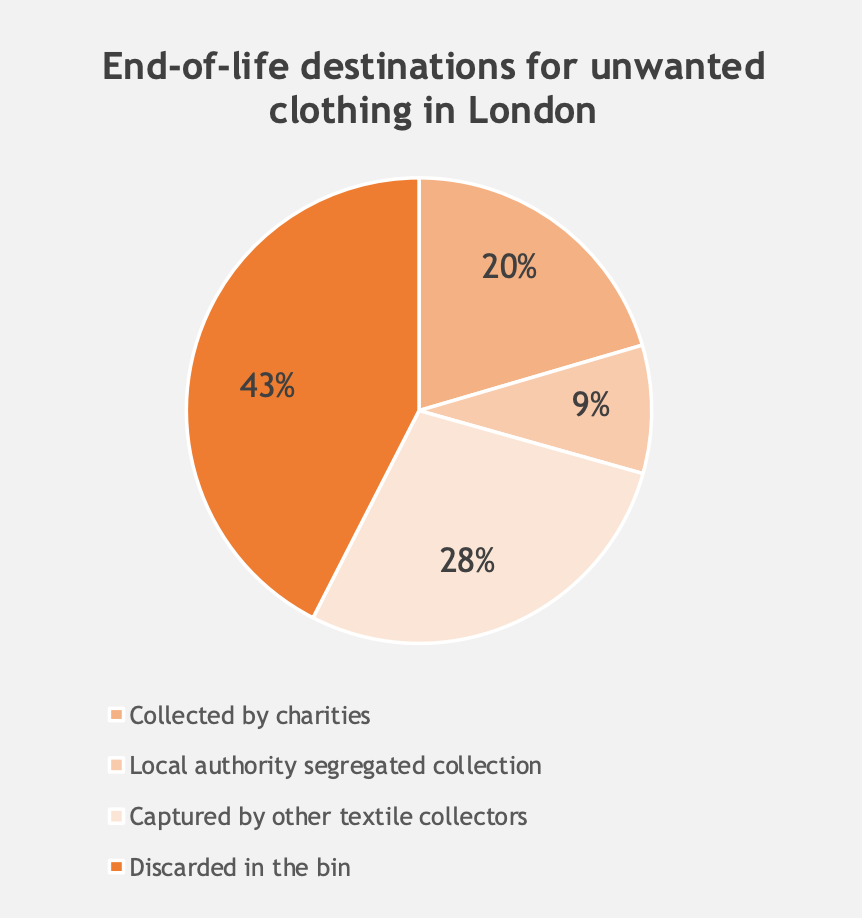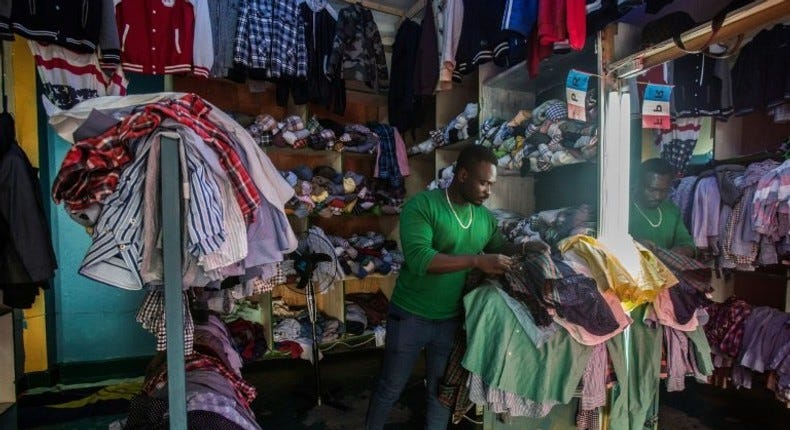Circular Fashion News / Apr 8th: Rental provider CaaStle's crisis, US de minimis impact on secondhand, Kenya tops African secondhand imports
What has recently happened in circular fashion space? A recap on the events and news from the past week.
Prefer audio over written format? Listen to this newsletter in a podcast format here.
Welcome to your weekly recap of circular fashion news! Some of last week’s events and highlights in the circular fashion industry included
Trump administration announcing the closure of the US de minimis, and ThredUp welcoming the decision as a boost for secondhand fashion
A publication highlighting the critical role of behavioural change in advancing circular fashion
The launch of London’s Textiles Action Plan, with action plans like clothing repair voucher scheme
Branded rental provider CaaStle facing major financial troubles
Kenya becoming the largest importer of secondhand textiles in Africa
State of the industry: 25% adoption rate can make circular solutions the norm, Textile waste problem called out by India’s PM, London Textiles Action Plan released
Publication on the importance of behavioural change in fashion: just a 25% adoption rate can make circular solutions the norm
A publication by Mirella Soyer from Rotterdam University of Applied Sciences, “Influencing Circular Behaviour – Positive Tipping Points in the Transition to a Circular Future”, highlights the crucial role of behavioural change in the fashion industry.
Soyer has developed a Transcircular Behaviour Model, designed to help us understand why individuals (or organisations) often don’t engage in circular practices and how that behaviour can be influenced more effectively.
The model identifies three key environments that shape our behaviour:
Physical environment: This refers to our material surroundings and how they either enable or hinder circular behaviour. Examples of supportive changes include making options more visible, such as providing clear infrastructure for clothing repair or reuse.
Social environment: This relates to the cultural and social environment around us. Behaviour can shift through social norms and role models, for instance, seeing a friend use a clothing rental service may inspire others to try it too.
Mental environment: This is our internal world of values, beliefs, emotions, and knowledge. Influencing this environment requires more tailored approaches. For example, if someone values independence and creativity, circular choices like wearing unique secondhand pieces can resonate strongly.
—> Read the study (in Dutch)
—> Read English summary from FashionUnited
London Textiles Action Plan aims to build a circular economy for fashion and textiles in London
The London Textiles Action Plan, developed by the Greater London Authority, London Councils' One World Living programme, ReLondon, and the Ellen MacArthur Foundation, was published as a strategic initiative aimed at transforming London's fashion and textiles sector into a zero-waste, low-carbon circular economy.
The plan has three key pillars:
Make things well: Emphasizing sustainable design and production processes to create durable and recyclable textiles.
Use textiles for as long as possible: Promoting behaviors and business models that extend the lifespan of textiles, including reuse, repair, rental, and sharing.
Reuse and recycle non-rewearable textiles locally: Enhancing local infrastructure for the collection, sorting, and recycling of textiles that can no longer be worn.
And the concrete action plan activities include for example:
Circular economy hubs for textiles: Developing local spaces for textile recovery, remanufacture, or reuse.
Repair voucher scheme: Subsidizing professional repair services to encourage garment repair.
Small business support: Offering advice, connections, and grants to circular fashion businesses, such as the ReWear Grant Programme, where businesses receive up to £15k to help them grow.
Textiles map/directory: Developing an online resource to help locate local businesses promoting circular models.

India’s Prime Minister calls out the global textile waste crisis
India’s Prime Minister, Shri Narendra Modi, has called attention to textile waste as a growing global concern. “Textile waste has become a major cause of worry for the whole world. Nowadays, the trend of discarding old clothes quickly and constantly buying new ones is on the rise,” he noted.
While voicing concern, Modi also highlighted positive developments within India, pointing to Panipat, Bengaluru, and Tirupur as leading examples of local solutions to the problem.
Bengaluru: The city has become a center for startups pioneering innovative textile solutions in India.
Fashion rental: Branded rental provider facing major problems, a UK library launches clothing rental
Branded rental provider CaaStle faces major financial troubles
CaaStle, a branded rental platform that helps fashion labels launch and manage rental programs, has announced it is facing significant financial difficulties and has furloughed its employees. The company’s CEO is also under investigation for financial misconduct.
CaaStle has raised a remarkable $530 million in total funding, with the aim of enabling fashion brands to tap into the rental market by providing the necessary infrastructure and logistics. Its clients have included brands such as Maje, Ralph Lauren, American Eagle, and Banana Republic, all of whom have since ended their rental programs.
According to Business of Fashion, one of the key challenges for brands entering the rental space is the limited selection they can offer in terms of clothing styles and items. While customers expect a broad variety of styles and labels, individual brands struggle to meet this demand. In contrast, peer-to-peer rental platforms and multi-brand services like Nuuly and The RealReal offer access to hundreds of brands, making them more appealing to consumers seeking choice and variety.
Clothing rental service launched in a UK library
A clothing rental service has been introduced at a UK library as part of a project led by Lizzie Dibble. The Oswestry Library in Shropshire now offers a selection of 400 clothing items available for rent. The initiative is currently run by volunteers and supported by a crowdfunding campaign as well as a grant from Shropshire Council.
Similar clothing rental services have previously been launched and tested for example in a library in Helsinki, Finland.
Fashion resale: Kenya secondhand imports, US de minimis removal helping fashion resale, affordability is the main motivation to buying secondhand fashion in the UK
Kenya becomes the largest importer of secondhand textiles in Africa
According to Massachusetts Institute of Technology (MIT) data, Kenya has become Africa's largest importer of secondhand fashion textiles.
In 2023, Kenya imported nearly $300 million worth of secondhand clothing and textiles. Ghana ranked second, with imports valued at $235 million (Sh30.4 billion), followed by South Africa at $228 million (Sh29.4 billion), Uganda at $211 million (Sh27.2 billion), and Nigeria at $209 million (Sh27 billion).
This growth has been driven in part by the Kenyan Parliament’s decision to remove different taxes impacting secondhand textile imports. Meanwhile, neighboring countries such as Uganda, Rwanda, and Ethiopia have introduced restrictions on secondhand clothing imports in efforts to boost local manufacturing.

ThredUp applauds the closure of de minimis as a win for secondhand fashion
At the same time as the Trump Administration announced new tariffs, putting the fashion industry on edge, they also (once again) declared plans to close the de minimis tax loophole. Under de minimis, purchases under $800 have been allowed into the U.S. tax-free. The administration initially proposed closing the loophole already earlier this year, but the decision was later revoked. Now, it remains to be seen whether it will actually be implemented this time around.
ThredUp, one of the biggest fashion resale players in the US, has already officially applauded the move to close de minimis. The change would particularly impact the likes of Shein and Temu, who have frequently benefited from the loophole, and ultimately increase the price of ultra-fast fashion. ThredUp believes that making fast fashion more expensive could lead to more consumers choosing secondhand options instead.
Affordability, fit, and style are the top priorities for UK consumers when buying secondhand fashion, whereas sustainability remains a nice-to-have
Statista has conducted a national survey in the UK, examining consumer motivations behind fashion purchases, with a particular focus on secondhand fashion.
The research shows that while 95% of consumers express concern about issues in the fashion industry and say these concerns influence their purchasing decisions, other factors still take precedence when it comes to actual buying behavior.
Affordability (63%) is the main driver for purchasing secondhand clothing. For fashion purchases in general, the most important criteria are fit (93%) and style (89%).
UK charity shop chain to close 74 shops
Scope, a UK-wide disability charity, has announced plans to close 74 of its 138 charity shops. The proposed closures come in response to projections that the organisation’s retail operations will face a £1.5 million loss this financial year.
According to Scope’s CEO, the decision stems from multiple factors: a shift in consumer habits towards online shopping, rising rent, energy, and staffing costs, as well as the broader impact of the UK’s cost-of-living crisis on their customer base. While some of Scope’s stores remain profitable, many are operating at a loss, prompting the organisation to make this decision.
Short news & Collaborations
Rimowa is dropping a vintage luggage collection in the US - As part of their Re-Crafted program, Rimowa buys used luggage from customers, refurbishes them, and resells them. They don’t make cosmetic improvements to the suitcases, highlighting that wear and tear should be seen as a sign of a well-traveled life. And customers seem to agree: previous drops of Rimowa’s vintage luggage have sold out within hours at around half the price of new pieces.
Sanctuary launched resale with Treet - US-based women’s lifestyle brand Sanctuary has launched its resale platform, ReSanctuary, using a third-party solution provider Treet. The platform will feature secondhand pieces directly sold by customers, but also deadstock and vintage items from Sanctuary itself.
Temperley London launched resale with Faume - British fashion brand Temperley London has launched its resale platform, Temperley Vintage, in collaboration with a third-party provider Faume. Items sold by customers are authenticated, quality-checked, and, if needed, repaired and cleaned. Buyers also receive a 14-day return policy.
Dhana Inc. and Accelerating Circularity have partnered to advance textile circularity - A fashion technology firm, Dhana Inc., and a non-profit, Accelerating Circularity, have partnered to promote textile circularity and sustainability through cutting-edge technologies and AI-powered solutions.
Circulose and Tangshan Sanyou Chemical Fiber form a strategic partnership - Circulose and Tangshan Sanyou have formed a strategic partnership to scale textile circularity by combining Circulose’s recycled material, CIRCULOSE®, with Sanyou’s ReVisco™ fibers, aiming to meet market demand for high-quality, circular textile solutions.









